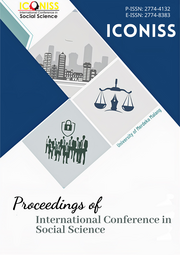Digital Constitutionalism and Sustainable Developments in Indonesia
DOI:
https://doi.org/10.26905/iconiss.v3i1.9691Keywords:
Carbon footprint, Digital Constitutionalism, Sustainable developmentAbstract
Digital space which is a modern platform where information and data flow, offers cross-border services and individual freedoms. Nonetheless, there are often problems related to basic rights and the emergence of power from the private sector. The sustainable development concept adopted in Indonesia has the meaning that any development must be able to maintain the quality of the environment. A pollutant that often goes unnoticed is the carbon footprint that comes from the digitalization process. Acknowledgment of the existence of digital space and its environmental impact raises the importance of a study on how the State can take part in implementing the mandate written in Article 33 sub-article (4) of the 1945 Constitution of the Republic of Indonesia concerning sustainable and green development. This is normative research that examines legal provisions, literatures, and secondary data. A legislative approach is carried out in this research by examining related regulations. It is concluded that provisions and recognition regarding the digital space in Indonesia are still only contained in the act (undang-undang). Other regulations governing the implementation of information and electronic systems in Indonesia have not explicitly reflected the concern for green development.
Downloads
References
Celeste, E. (2019). Digital constitutionalism: A new systematic theorization. International Review of Law, Computers & Technology, 33(1), 76-99. https://doi.org/10.1080/13600869.2019.1562604
Christmas, S. K. & Aminah. (2019). The principles of environmental based development in international law and sustainable development goals. Jurnal Hukum Novelty, 10(2), 101-110. http://dx.doi.org/10.26555/novelty.v10i2.a13910
Craig, P. (2001). Constitutions, constutionalism, and the european union. European Law Journal, 7(2), 125-150.
United Nations. Declaration of the United Nations Conference on the Human Environment 1972.
De Gregorio. G. (2020). The rise of digital constitutionalism in the European Union. International Journal of Constitutional Law, 19(1), 41-70. https://ssrn.com/abstract=3506692
Ibrahim, J. (2007). Teori dan Metodologi Penelitian Hukum Normatif. Bayu Media Publishing.
Kementerian Keuangan Republik Indonesia. (2021). Pajak Karbon Di Indonesia Upaya mitigasi perubahan iklim dan Pertumbuhan Ekonomi Berkelanjutan. Webinar Penyelenggaraan Nilai Ekonomi Karbon Di Subsektor Ketenagalistrikan.
Klarin, T. (2018). The concept of sustainable development: From its beginning to the contemporary issues. Zagreb International Review of Economics and Business, 21, 67-94. http://dx.doi.org/10.2478/zireb-2018-0005.
Pemerintah Indonesia. Undang-Undang No. 11 Tahun 2008 tentang Informasi dan Transaksi Elektronik.
Pemerintah Indonesia. Undang-Undang No. 7 Tahun 2021 tentang Harmonisasi Peraturan Perpajakan.
Pemerintah Indonesia. Undang-Undang No. 32 Tahun 2209 tentang Perlindungan dan Pengelolaan Lingkungan Hidup.
Redeker, D., Gill, L., & Gasser, U. (2018). Towards digital constitutionalism? Mapping attempts to craft an Internet Bill of Rights. International Communication Gazette, 80(4), 302-319. http://dx.doi.org/10.2139/ssrn.2687120
Lewis, B. (2012). Environmental rights or a right to the environment? Exploring the nexus between human rights and environmental protection. Macquarie Journal of International and Comparative Environmental Law, 8(1), 36-47.
Lex, G, Redeker, D, and Gasser, D. (2015). Towards Digital Constitutionalism? Mapping Attempts to Craft an Internet Bill of Rights. Berkman Klein Center for Internet & Society Research Publication 2015-15.
Li, W. X. J. & Zheng, M. (2018). Green governance: New perspective from open innovation. Sustainability. http://dx.doi.org/10. 3845. 10.3390/su10113845.
Marzuki. (2010). Konstitusi dan konstitusionalisme. Jurnal Konstitusi, 7(4).
Marzuki, P. M. (2007). Penelitian Hukum. Penerbit Kencana
Monserrate, S. G. (2022). The cloud is material: On the environmental impacts of computation and data storage. MIT Case Studies in Social and Ethical Responsibilities of Computing. https://doi.org/10.21428/2c646de5.031d4553
Purniawati, P., Kasana, N., & Rodiyah, R. (2020). Good environmental governance in Indonesia (perspective of environmental protection and management). The Indonesian Journal of International Clinical Legal Education, 2(1), 43-56. https://doi.org/10.15294/ijicle.v2i1.37328
Putra, A. (2020). Kertas Advokasi Kebijakan Atas UU No. 11 Tahun 2020 tentang Cipta Kerja Bidang Sumber Daya Alam. Pusat Studi Hukum dan Kebijakan Indonesia.
Rahayuningsih, M., Handayani, L., Abdullah, M., & Solichin, Arifin, M. S. (2021). Kajian jejak karbon (carbon footprint) di FMIPA Universitas Negeri Semarang. Indonesian Journal of Conservation 10(1) 48-52, https://doi.org/10.15294/ijc.v10i1.30038.
Santosa, P. (2008). Administrasi Publik: Teori dan Aplikasi Good Governance. PT. Refrika Aditama.
Sharma, P. & Dash, B. (2022). The digital carbon footprint: Threat to an environmentally sustainable future. International Journal of Computer Science and Information Technology, 14(3), 19-29. http://doi.org/10.5121/ijcsit.2022.14302
Sukismo, B. (2008). Karakter Penelitian Hukum Normatif dan Sosiologi. Penerbit Puskumbangsi Leppa Universitas Gadjah Mada.
Wisadha, A., Adhitya, M., & Widyaningsih, G. A. (2018). Human rights and the environmental protection: The naïveté in environmental culture. Udayana Journal of Law and Culture, 2(1), 73-96. https://doi.org/10.24843/UJLC.2018.v02.i01.p04.
Yusa, I. G. & Hermanto, B. (2018). Implementation of green constitution in Indonesia: Guarantees of constitutional rights of sustainable environmental development. Jurnal Konstitusi, 15(2).
Downloads
Published
Issue
Section
License
Authors who publish in this journal agree to the following terms:
(1)Â Copyright of the published articles will be transferred to the journal as the publisher of the manuscripts. Therefore, the author confirms that the copyright has been managed by the journal.
(2) Publisher of Proceedings of International Conference in Social Science is the University of Merdeka Malang.
(3) The copyright follows Creative Commons Attribution–ShareAlike License (CC BY SA): This license allows to Share — copy and redistribute the material in any medium or format, Adapt — remix, transform, and build upon the material, for any purpose, even commercially.

